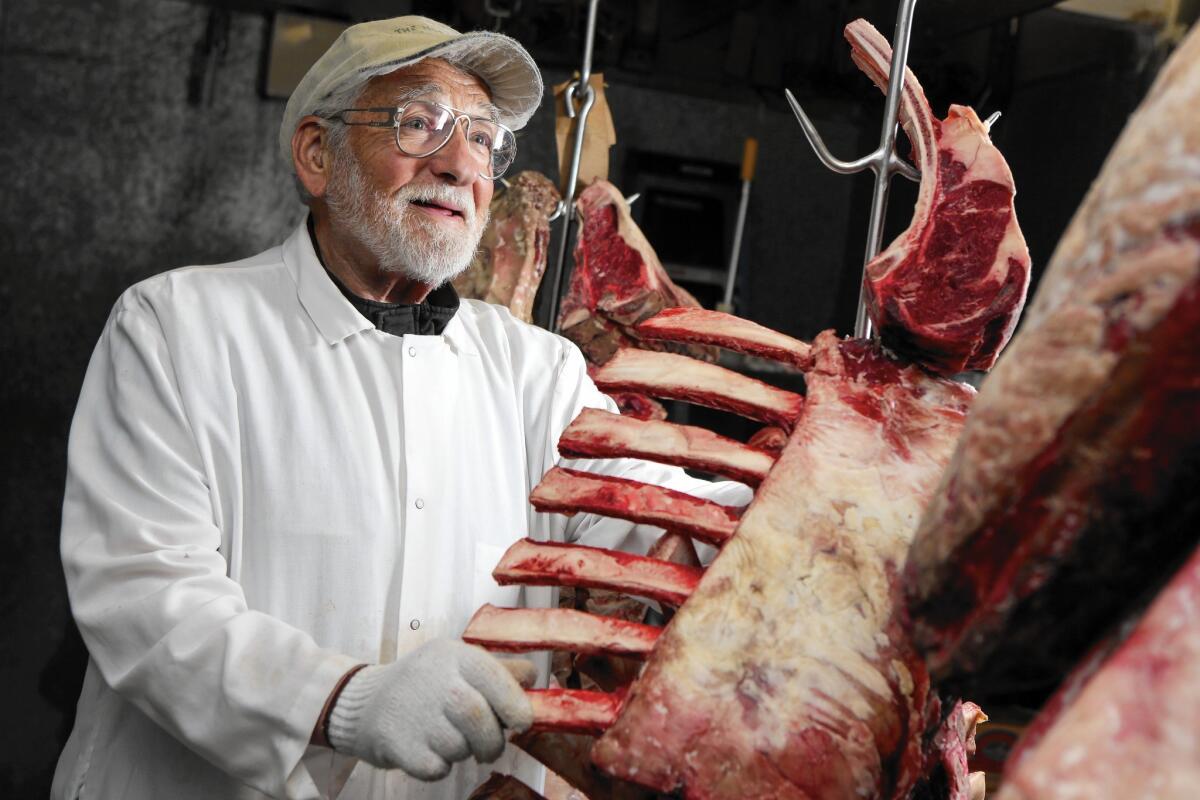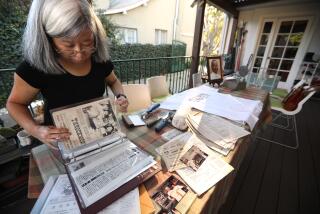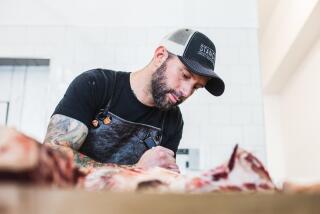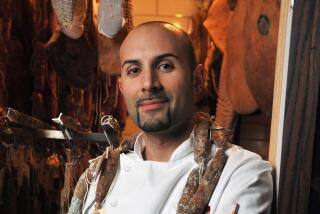Great Read: Celebrated butcher carves out niche in L.A.’s culinary scene

Wolfgang Puck remembers the time he brought his butcher to Cannes. It was 1976, and the chef was catering an opening night dinner for the film festival. He decided he needed Harvey Gussman — and his beef.
“He was like a shepherd, bringing the meat with him to France, and then he had to get it out of customs,” Puck said. “We got it out, and he cut it to order. I took him out and told everybody, ‘That’s my meat guy.’”
For six decades, Gussman has provided cuts of meat to a who’s who of Los Angeles’ culinary scene, from Puck to Pink’s Hot Dogs.
Even though the butcher is 81 now, his Miracle Mile shop is still a cult favorite among the handful of restaurateurs he’ll sell to — including Kogi BBQ truck creator Roy Choi — and in-the-know retail clients.
Inside, Harvey’s Guss Meat Co. is an unforgiving place, all concrete and cold steel. The clang of butchering implements and the whir of machinery create an endless din broken only by the occasional whine of electric saws cutting through bone.
“You walk in here and it looks like a time capsule,” Brian Baskett, a longshoreman turned butcher, said as he swept bone dust off a counter where he’d been carving filet mignon steaks. “It’s a throwback to old butchering that you hardly can find anywhere.”
Gussman puts on a gruff and sometimes surly front — accentuated by his bristly white beard and unruly eyebrows — but also seems eager to flash a wry sense of humor. When a reporter asked Gussman to direct him to the shop’s restroom, he pointed it out, laughing:
“It says men, but what the hell, reporters are welcome.”
::
Gussman’s father, Abraham, started the meat company in 1939, selling his wares across L.A. out of the back of a truck. He later rented refrigerated warehouse space on Jefferson Boulevard before moving to Guss Meat’s current location on Ogden Drive in 1947.
When Gussman returned from a stint in the Coast Guard in 1954, he jumped right into the family business. He worked alongside his father until 1966, when the elder Gussman retired. For the next 30 years, Harvey Gussman and his brother, Irwin, ran the business together. (Irwin, now deceased, retired in the mid-1990s.)
The shop sells about 200 items, from the mundane (turkey, pork and chili) to the exotic (bull testicles and beef heart). But Guss Meat is best known for its dry-aged steaks — porterhouses, rib-eyes and filet mignon. Some beef hangs in the shop’s aging room for up to 30 days, giving it a depth of flavor that connoisseurs swear by.
There are, of course, other old-school butcher shops in L.A., and a growing crop of new establishments with an artisan’s touch. But none like Guss Meat, his patrons say.
“He probably is the best. He ages it very well, better than other people,” said Gino Angelini, owner of his namesake Italian restaurant, Angelini Osteria, which has long served a bistecca alla fiorentina sourced from Guss Meat. “The meat he buys, it’s always the right meat. Not many people know the meat.”
L.A.’s culinary scene has exploded in recent years, but Gussman has been slowing down. Long gone are big clients such as Pink’s and Puck, the latter of whom was forced to turn to larger operations. But Gussman didn’t bother to replace them. He has turned down, for example, business with Boa Steakhouse, a trendy Sunset Boulevard haunt. And these days, he’s also dialed back his hours and made a habit of declining some quickie requests.
“The really big orders — come up with 2,400 filet mignon steaks in two days — it’s not my cup of tea,” he said.
Gussman is content to work with the restaurateurs and caterers with whom there’s a certain level of ease. Choi says Gussman never ran a credit check on him before he starting buying beef from Guss Meat for his eateries A-Frame, Commissary and Pot.
“The moment I met him, it was like walking into a nonna‘s house,” the chef said. “Harvey’s got an amazing sweater game. And that, coupled with his beard?
“It’s a weird thing now to find people whose intentions are so humble.”
Choi said he can’t always afford to buy from Guss Meat, whose quality cuts — sourced from meatpacking company IBP — come with the attendant robust prices. (The wholesale price for aged New York steak, a standby, is $28 a pound — $32.50 for retail customers.)
“I don’t haggle with Harvey,” Choi said. “The price is the price.”
::
There’s a rhythm to Gussman’s day, and a routine he seems to relish.
He gets up at 3:30 a.m. every workday. After breakfast — he’ll have a banana, yogurt and a glass of orange juice — he makes the short drive from his Carthay home to the shop. He arrives at 4:45 a.m., opens up, makes himself a double shot of espresso and listens to the answering machine for orders. It’s quiet then, but not for long.
His employees start arriving at 5:30 a.m. — besides butcher Baskett, the workers include a driver, manager and warehouseman — and then the shop hums to life.
As early as 6 a.m., a uniformed U.S. Department of Agriculture inspector arrives to make a daily examination of the facilities.
A stone-faced inspector is reticent around a reporter, and won’t submit to an interview or even provide her name. But Gussman gets her to warm up as he explains that she’s on hand to ensure the beef is being stored at a safe temperature.
Above 44.6 degrees Fahrenheit, “it’s possible to pick up things like E. coli — and Ebola,” Gussman jokes.
The inspector finally cracks a smile. The steaks in question are 39 degrees.
After 7 a.m., a few retail customers start to trickle in to retrieve their orders. (Guss Meat doesn’t allow walk-in business: Retail customers have to call in or fax their order a day in advance.)
A regular, David Luwisch, swings by to pick up four steaks, including two hulking porterhouses, that he says cost nearly $200 in all. Luwisch, a New York native, has been buying from Gussman for the better part of a decade after researching butcher shops in L.A. on par with the quality of his beloved Lobel’s of Manhattan.
“The marbling is much better than what you get elsewhere, and that’s where the flavor comes from,” says Luwisch, an investment banker at Credit Suisse. “I’ll season it very well with a good healthy coating of sea salt and I’ll use a little bit of canola oil and that’s it.”
Gussman closes each day at 12 p.m. and heads home to walk his Maltese, Piper, and take a nap. Oftentimes, he’ll bring home veal chops, New York steaks or a whole chicken that his wife, Lynne Gussman, will prepare for dinner.
“She’s my bookkeeper, my accountant, my best friend, my boss,” Gussman said of his wife of 48 years. (She says her husband’s favorite dish is a pan-seared veal chop served with a sauce of tomatoes, mushrooms and port. “He carries around a photo of that.”)
::
Gussman may have a routine that’s been expertly honed over the decades, but he’s contemplating some big changes. He’s thinking about retiring, and imagining how he might spend his days. There are languages to learn and books to read. Lynne Gussman said she thinks her husband could stay occupied if he stopped working, but she’s worried about it.
“Basically everyone we know who has retired has passed away,” she said. “I think retirement is for the young.”
Gussman recently put the building that houses Guss Meat up for sale. The prospect of unloading the property has put a focus on the fate of the business, and it’s a sensitive issue. After all, with his son an accountant and his daughter in the real estate business, it’s not clear what would happen to the meat company Gussman inherited from his father.
“I don’t know what to tell you, really,” said Gussman, his voice catching. “I just can’t see selling the business.”
When Gussman finally does call it quits — whenever that may be — there will be one less person doing things the old-fashioned way in L.A.
“He’s an anomaly in this world now,” Choi said. “You find people who are so focused on their craft, and the world and time just don’t exist.”
Twitter: @DanielNMiller
More to Read
Start your day right
Sign up for Essential California for news, features and recommendations from the L.A. Times and beyond in your inbox six days a week.
You may occasionally receive promotional content from the Los Angeles Times.







